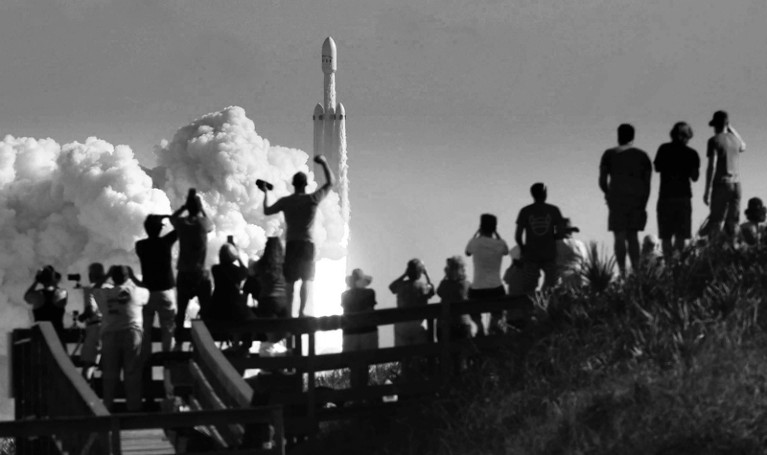
The launch of the Falcon Heavy rocket opens up deep space to companies such as SpaceX.Credit: Orlando Sentinel/TNS/Sipa USA/REX/Shutterstock
When David Bowie revealed the inspiration for his breakthrough hit ‘Space Oddity’, it came as a surprise to many: not the Apollo missions to the Moon but the film 2001: A Space Odyssey (Kubrick, 1968). And it’s easy to see why: the film’s ballet of the spinning space station and dark themes about our place in the Universe has a distinct aesthetic appeal.
Does space travel still inspire? The continuing high profile of the International Space Station (ISS) and the welcome early steps of China and others aside, an extraordinary thing has happened. For much of the public, humanity’s adventures in space have become history, something people used to do in the old days. (Exhibit A: the Space Shuttle, once a means to escape the surly bonds of Earth, is now a museum piece.)
But spaceflight suddenly seems futuristic again. How else to explain the reaction to the spectacle of last week’s successful maiden launch of Falcon Heavy, the giant rocket built by Elon Musk and his company SpaceX. The hashtag generation has witnessed its own moment of inspiration writ large in the heavens.
The launch wasn’t perfect, but it still came across as a stunning synchrony of power and control. The 27 Merlin engines blazed to lift their giant cargo towards the sky, accompanied by cheers and whoops on the ground. And then, with exquisite control, the side boosters separated, back-flipped in tandem towards Earth and settled on landing pads at Florida’s Cape Canaveral Air Force Station with a rapid volley of ear-splitting sonic booms.
The Saturn V rocket NASA created in the 1960s for the Apollo missions remains the most powerful rocket ever built. But since Apollo there has been an almost 50-year hiatus in missions to take people beyond low Earth orbit. The successful launch of the Falcon Heavy will surely mark the beginning of the end of this hiatus. It is nothing short of historic, and Musk deserves enormous credit. Yes it was flashy — gimmicky, even — but there was substance behind the style.
Not without his faults, Musk has nevertheless shown himself to be a visionary with verve, can-do grit, a dash of genius and an abundance of hubris. SpaceX has roundly confounded many naysayers and up-ended the launcher industry. Tesla, Musk’s electric-vehicle company, faces enormous challenges, but has still helped to persuade many in the automotive industry that fossil-fuel engines belong in museums alongside the shuttle.
Musk’s goals for space are characteristically audacious. He intends SpaceX’s Dragon capsule to carry people later this year, and Falcon Heavy’s less powerful sibling — the Falcon 9 workhorse — to ferry astronauts to the ISS.
But it is the void beyond on which all sights are now set. Commercial companies have finally cracked access to deep space. Access to interplanetary trajectories — and the decisions about where to head — is no longer limited to governments. Musk wants to take people to Mars, which still seems a long shot — but space tourism suddenly feels like a more realistic prospect.
Together, Musk and his rocket are showing what a combination of big ideas and big money can achieve, and so inspiring the next generation to dream big. Still, for all the thrill of the new, it’s worth remembering just how much last week’s launch — like so much in science — builds on the achievements of others. Falcon Heavy took off from the historic Launch Complex 39A (LC-39A) at the Kennedy Space Center on Merritt Island in Florida, from where the Apollo Moon landings also began their journeys.
And although Musk’s choice of test payload — his own cherry-red Tesla Roadster with a mannequin at the wheel and playing ‘Space Oddity’ on a loop — received as much attention as the rocket that carried it, SpaceX is not the first to put a car into space. From LC-39A, NASA did the same. Then it landed its car on the Moon. And then it drove it around. Not bad for the old days.

 Indian start-up’s Moon mission in doubt
Indian start-up’s Moon mission in doubt
 China needs to listen to its researchers to become a scientific superpower
China needs to listen to its researchers to become a scientific superpower

